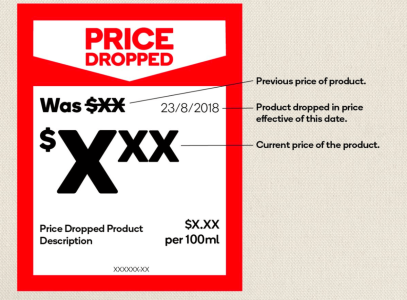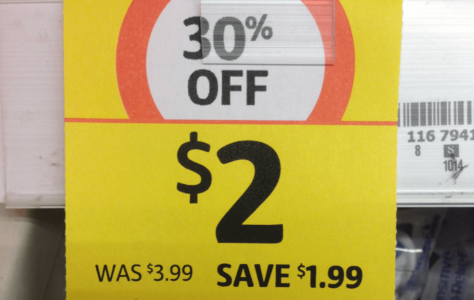Are supermarkets pulling a fast one with 'sneaky' discount tactics?
- Replies 31
We always appreciate a good bargain, and we know that most of you regularly shop at supermarkets like Woolworths and Coles.
However, we've stumbled across a few reports claiming to have noticed a rather questionable pricing strategy going on in these major grocery chains.
According to an unhappy Woolworths customer who posted on a forum website, they've observed the retailer's prices on popular products being raised so that they can add a large 'Prices Dropped' tag on the shelves.
Shoppers have voiced their frustrations at the seemingly arbitrary price fluctuations followed by seemingly generous discounts. Other forum users said Coles seems to follow the same pattern: 'Coles does the exact same thing.'
Take the case of a 30-pack box of Pepsi Max: the forum user dug up some records, revealing that the price dropped from $33.50 to $24 on August 30 last year and remained there for quite some time.
However, around April 17, 2023, the price suddenly shot up to $35 before dropping again to $26, now with a 'Was $35 on 17/5/23' sticker. The question here is, who's benefiting from this practice? The customer or the supermarket?
Several other shoppers jumped in with their personal experiences, expressing frustration with the sense of false savings provided by these pricing strategies.
One disgruntled customer criticised the supermarkets, claiming, 'They have made record profits in a time when the supposed reason for price hikes were cost increases for them.'
Professor Jana Bowden of Marketing and Consumer Psychology at Macquarie University advises shoppers to remain wary. 'Big brands regularly raise and then drop their prices at various times throughout the year to encourage consumers to buy,' Professor Bowden told a news outlet.
'Promotional sales tags or "specials" discourage consumers from doing their price homework.'
According to the Australian Competition and Consumer Commission (ACCC) guidelines, a 'was' or 'strikethrough' price must have been paid by customers for a reasonable period before a sale began; the term 'reasonable' varies from situation to situation.
It appears that these discounts elicit excitement, leading customers to make purchases based on emotion and impulse rather than logic. It's easy to fall for the eye-catching end-of-aisle displays in supermarkets, featuring enticing multi-pack soft drink 'bargains'.
Unfortunately, shoppers often assume that a discount tag signifies an excellent buying opportunity.
Professor Bowden urges vigilance: 'Consumers need to do their homework, especially for products they buy often. That means researching prices over time, knowing what specials are likely to crop up and when, and being aware of whether a promotion is a legitimate promotion or not. It really is a case of buyer beware.'

In their defence, a Woolworths spokesperson addressed the fluctuating prices, attributing them to significant supplier cost increases over the past 12 to 18 months, resulting in higher retail prices.
They explained, 'Woolworths endeavours to be very clear with its pricing so customers can see the benefit of the shelf price reductions in their seasonal "Prices Dropped" program, regardless of whether it's through our catalogue, in-store or online. The purpose of our seasonal and longer-term "Prices Dropped" programs is to provide better price certainty for longer on lower shelf prices for our customers.'

We urge our Senior Discount Club members to be savvy shoppers and keep an eye out for the fairness of supermarket pricing tactics. Always double-check whether 'discounted' items are genuinely a good deal or just another marketing ploy.
With that said, what are your thoughts on these 'sneaky' pricing tactics in supermarkets? Have you encountered similar experiences? Perhaps you have other noteworthy observations from your supermarket visits that you'd like to share. We would love to hear your input, so please feel free to leave your comments below!
However, we've stumbled across a few reports claiming to have noticed a rather questionable pricing strategy going on in these major grocery chains.
According to an unhappy Woolworths customer who posted on a forum website, they've observed the retailer's prices on popular products being raised so that they can add a large 'Prices Dropped' tag on the shelves.
Shoppers have voiced their frustrations at the seemingly arbitrary price fluctuations followed by seemingly generous discounts. Other forum users said Coles seems to follow the same pattern: 'Coles does the exact same thing.'
Take the case of a 30-pack box of Pepsi Max: the forum user dug up some records, revealing that the price dropped from $33.50 to $24 on August 30 last year and remained there for quite some time.
However, around April 17, 2023, the price suddenly shot up to $35 before dropping again to $26, now with a 'Was $35 on 17/5/23' sticker. The question here is, who's benefiting from this practice? The customer or the supermarket?
Several other shoppers jumped in with their personal experiences, expressing frustration with the sense of false savings provided by these pricing strategies.
One disgruntled customer criticised the supermarkets, claiming, 'They have made record profits in a time when the supposed reason for price hikes were cost increases for them.'
Professor Jana Bowden of Marketing and Consumer Psychology at Macquarie University advises shoppers to remain wary. 'Big brands regularly raise and then drop their prices at various times throughout the year to encourage consumers to buy,' Professor Bowden told a news outlet.
'Promotional sales tags or "specials" discourage consumers from doing their price homework.'
According to the Australian Competition and Consumer Commission (ACCC) guidelines, a 'was' or 'strikethrough' price must have been paid by customers for a reasonable period before a sale began; the term 'reasonable' varies from situation to situation.
It appears that these discounts elicit excitement, leading customers to make purchases based on emotion and impulse rather than logic. It's easy to fall for the eye-catching end-of-aisle displays in supermarkets, featuring enticing multi-pack soft drink 'bargains'.
Unfortunately, shoppers often assume that a discount tag signifies an excellent buying opportunity.
Professor Bowden urges vigilance: 'Consumers need to do their homework, especially for products they buy often. That means researching prices over time, knowing what specials are likely to crop up and when, and being aware of whether a promotion is a legitimate promotion or not. It really is a case of buyer beware.'

A spokesperson for the supermarket cited supplier cost increases for the fluctuating prices. Credit: Twitter/Woolworths.
In their defence, a Woolworths spokesperson addressed the fluctuating prices, attributing them to significant supplier cost increases over the past 12 to 18 months, resulting in higher retail prices.
They explained, 'Woolworths endeavours to be very clear with its pricing so customers can see the benefit of the shelf price reductions in their seasonal "Prices Dropped" program, regardless of whether it's through our catalogue, in-store or online. The purpose of our seasonal and longer-term "Prices Dropped" programs is to provide better price certainty for longer on lower shelf prices for our customers.'
Key Takeaways
- A Woolworths shopper shared an observation of the retailer's discount tactics on a popular forum, stirring anger among other customers.
- Many shoppers responded with their own examples of supermarkets using this discount tactic, and some claimed Coles does the 'exact same thing'.
- Professor Jana Bowden, an expert in marketing and consumer psychology, says that customers need to do their research and be vigilant when it comes to deals and promotional sales tags.
- In a statement, a Woolworths spokesperson explained the reasoning for fluctuating prices, citing supplier cost price increases and the company's effort to provide clear pricing information to customers.
We urge our Senior Discount Club members to be savvy shoppers and keep an eye out for the fairness of supermarket pricing tactics. Always double-check whether 'discounted' items are genuinely a good deal or just another marketing ploy.
With that said, what are your thoughts on these 'sneaky' pricing tactics in supermarkets? Have you encountered similar experiences? Perhaps you have other noteworthy observations from your supermarket visits that you'd like to share. We would love to hear your input, so please feel free to leave your comments below!








